WORKSHOPS
The 2023 IEEE AFRICON Workshops will include a mix of regular and invited presentations based on regular and invited papers, and invited presentations and panels to facilitate highly interactive sessions.
Click on the Panel Topic to view more details about it.
Abstract
The emergence of FinTech has transformed the financial services industry, and Africa is no exception. With its rapidly growing population and economy, the continent is a hotbed for FinTech innovation (e.g., M-Pesa), providing opportunities to improve financial inclusion and drive economic growth and prosperity. This workshop will explore the current state of FinTech in Africa, the innovations shaping the industry, and the challenges and opportunities that lie ahead. The discussion will also address how FinTech and financial inclusion go hand in hand, advancing some of the UN SDGs (esp. 8,9,10 and 17). The role of AI and data in enhancing core FinTech frameworks will also be explored, keeping in mind the low-resource backdrop.
Towards the end of the workshop, we will summarize the key points discussed and provide a call to action for attendees. We will encourage attendees to get involved in the (responsible growth of) FinTech industry in Africa, keeping financial inclusion in mind, whether as entrepreneurs, investors, academics, or policymakers.
Organizing Committee
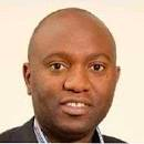
Prof. Chimwemwe Chipeta
Director
Wits Fintech Hub,
University of the Witwatersrand, South Africa
Dr. Chipeta is a Professor of Corporate Finance, Director of the Wits Fintech Hub and Head of the Finance division in the School of Economics and Finance at the University of the Witwatersrand. Chimwemwe is an experienced researcher and a financial scholar with a valid NRF rating (Y2 Rating) and has published numerous papers in the field of Corporate Finance and Investments. Chimwemwe has presented his work at numerous national and international conferences. His work appears in high impact journals such as Emerging Markets Review and Investment Analysts Journal. He has several years of consulting experience in areas relating to Financial Research, Business Plan Consulting for Small and Medium Size Enterprises and Executive Education. He has a PhD in Financial Management from the University of Pretoria and has been a visiting Professor at the J. Mack Robinson College of Business at Georgia State University in the US.

Prof. Patrick McSharry
Research Professor,
Carnegie Mellon University Africa,
Kigali, Rwanda
Patrick McSharry is a research professor at Carnegie Mellon University Africa, director of the World Bank funded African Centre of Excellence in Data Science (ACE-DS) in Rwanda and a member of the Kigali Collaborative Research Centre. Having served 22 years at Oxford University, McSharry remains affiliated with the Oxford Man Institute of Quantitative Finance, the Mathematical Institute, the Department of Computer Science, and the Oxford Internet Institute. He is a Fellow of the Royal Statistical Society, Senior Member of the IEEE and Senior Academic Member of the Willis Research Network and advises on working groups for insurance, open data and big data. McSharry was awarded a Royal Academy of Engineering Research Fellowship and two Marie Curie Research Fellowships (UK and Spain). He takes a multidisciplinary approach to developing quantitative techniques for data science, decision-making, and risk management. His research focuses on big data, forecasting, predictive analytics, machine learning, and the analysis of human behaviour. He has published over 100 peer-reviewed papers, three books, and advises national and international government agencies and firms in the insurance, finance, agriculture, energy, telecoms, environment, education, and healthcare sectors.
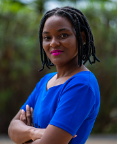
Prof. Edith Luhanga
Assistant Research Professor,
Carnegie Mellon University Africa,
Kigali, Rwanda
Edith Luhanga joined CMU-Africa as a postdoctoral researcher in June 2021 and transitioned to assistant research professor in September 2022. Prior to that, she was a lecturer at the Nelson Mandela African Institution of Science and Technology in Tanzania (NM-AIST). She holds a Ph.D. in information science from Nara Institute of Science and Technology in Japan, an MSc in advanced computing science, and a BEng (Hons) in electronic and computer engineering from the University of Nottingham, UK. Luhanga’s research focuses on designing theory-based behavior change systems that consider people’s personal and socio-cultural contexts, through a human-centered approach. Her main domains of interest are health (particularly nutrition, maternal and child health, and disabilities management), financial inclusion, and privacy and security. She was the deputy project leader for a 10-year project on capacity building through digital technologies at NM-AIST and served as Tanzania’s representative to the UNESCO intergovernmental committee on drafting recommendations on the ethics of artificial intelligence in 2021.

Karen Sowon PhD
Postdoctoral Research Associate,
Carnegie Mellon University Africa,
Kigali, Rwanda
Karen Sowon completed her Ph.D. in Information Systems from University of Cape Town. She is currently a postdoctoral research associate at Carnegie Mellon University, affiliated with CyLab, the Security and Privacy Institute that works closely with CMU Africa. She has previously served as a teaching and research assistant in the Department of Information Systems at UCT and worked as a research fellow at the Cybersecurity Capacity Centre for Southern Africa (C3SA), hosted in the same department at UCT. In addition to conducting research, Karen taught IT-related courses at Strathmore and Kabarak Universities in Kenya. Being an enthusiast of Information and Communication (ICT) related development, Karen is keen to engage in work that will contribute to addressing some of the global and local opportunities and challenges related to the use of ICTs and its innovations especially as concerns technology users. She desires for her work to contribute to the formulation of policies and designs of IT innovations that will foster sustainable, empowering, and inclusive techno-enabled societies, economies, and organizations.
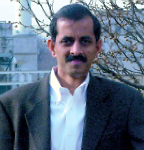
Ganesh Mani, PhD, MBA
Distinguished Service Professor of Innovation Practice,
Carnegie Mellon University,
Pittsburgh, USA
Ganesh Mani is an Adjunct faculty member at CMU Africa and a Distinguished Service Professor of Innovation Practice on the main campus (Pittsburgh, USA) in its business school (Tepper). Ganesh has worked on scaling human expertise via AI in many milieus. He co-founded Advanced Investment Technology (one of the earliest start-ups to combine investment management and machine learning), which was acquired by State Street Corporation, creating its Advanced Research Center for helping manage multibillion-dollar institutional portfolios. Ganesh has contributed to other AI start-ups, including an entity that is now part of Nasdaq-listed iCAD, employing machine learning techniques for early cancer detection. Ganesh has an MBA in finance, a PhD in AI from the University of Wisconsin-Madison and a BTech in Computer Science from IIT-Bombay. He is past-President and long-term board member of TiE’s Pittsburgh chapter, co-MD of TiE Pittsburgh Angels; and on the advisory board of the FDP Institute as well as journals such as Financial Data Science and Patterns. Ganesh’s work has been patented, featured in a Barron’s cover story and published in leading academic journals and popular opinion pages. He has previously taught courses such as AI Grand Challenges (overlapping with AI and Emerging Economies) for the CMU Africa and Qatar students.
Abstract
The first part will introduce IEEE Standards Association, the relevance of standards to the technology ecosystem, and its engagements on the African continent. It will also introduce its program Planet Positive 2030, an initiative supported by IEEE SA for global sustainability.
Goal 1
Transform society and infrastructure to achieve Planet Positive 2030.
That means: Reducing GreenHouse Gas (GHG) emissions to 50% of 2005 emissions by 2030 and significantly increasing regeneration and resilience of earth’s s ecosystems; effectively to be well on the path to achieving net zero GHG emissions by 2050 and negative GHG emissions beyond 2050, that is, to be planet positive.
Goal 2
Identify the current technological solutions that need to be deployed widely as well as technology gaps for which we need to design, innovate and deploy new technological solutions to reach Planet Positive 2030.
The first draft compendium of Planet Positive 2030, called Strong Sustainability By Design, is open for public comment, and we invite all stakeholders, and in the context of AfriCon interested persons from the African continent, to provide their feedback. Please go here to download it: https://sagroups.ieee.org/planetpositive2030/our-work/
Organizing Committee
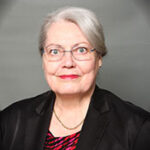
Maike Luiken, PhD, SMIEEE, IEEE-HKN, FIEC
Managing Director, R&D, at a start-up company
and
Adjunct Research Professor,
Western University, Canada
Maike Luiken, PhD, SMIEEE, IEEE-HKN, FIEC, chairs Planet Positive 2030 – an initiative of the IEEE Standards Association – and the P7800 Standards Working Group: Recommended Practice for Addressing Sustainability, Environmental Stewardship and Climate Change Challenges in Professional Practice. She co-chairs the IEEE Future Directions Climate Technologies Sustainability Initiative. She served as the IEEE VP MGA, 2021, and as President, IEEE Canada, 2018-19 and as Chair, Policy Track, IEEE Internet Initiative, 2017-18
Maike is a longtime advocate for sustainable development and is driven to develop and leverage technology to achieve a more sustainable planet.
She is managing director, R&D, at a start-up company and Adjunct Research Professor at Western University, Canada.
Maike’s career spans academia and industry: from professor to leading the Bluewater Sustainability Initiative, 2006-2013, founding Director, Lambton Manufacturing Innovation Centre, eight years as Dean, Lambton College, with several portfolios: School of Technology, Sustainable Development, and Applied Research. Her strategic leadership and vision led to Lambton College becoming one of the top Research Colleges in Canada.
Her areas of interest and expertise span diverse technical areas from ICT, energy, and water to advanced manufacturing. She has particular interest in how progress and deployment of various technologies contributes – or not – to achieving sustainable development.
She is currently serving/has been serving on numerous Boards of Directors and Committees, including IEEE, IEEE Canadian Foundation, Canadian Standards Council Steering Committee of the Artificial Intelligence and Data Governance Standardization Collaborative.
Maike has experience in the public and private sectors in Canada and has worked in the USA and Germany. She obtained degrees from the Technical University of Braunschweig, Germany, and the University of Waterloo, Canada (PhD, Physics).
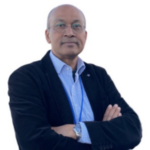
Prof. Vikass Monebhurrun
Corresponding Member,
IEEE Region 8 Standards Coordination Subcommittee and
IEEE Technical Activities Board Committee on Standards
Vikass Monebhurrun received the PhD degree in electronics in 1994 and the Habilitation à Diriger des Recherches (HDR) in physics in 2010 from Université Pierre et Marie Curie (Paris VI) and Université Paris- Sud (Paris XI), respectively. He was engaged in research on electromagnetic non-destructive testing for nuclear power and aeronautical applications until 1998, following which he joined the Department of Electromagnetics at Supélec (CentraleSupélec since 2015). His research interests encompass time domain numerical modeling as well as radio frequency measurements. He actively participated in French National Research Programs on dosimetry of wireless communication systems since 1998: 2G (1999-2002) 3G (2003-2005) and 4G (2007-2010). His research contributed to international standardization committees of CENELEC (European Committee for Electrotechnical Standardization), International Electrotechnical Commission (IEC), and IEEE.
He is author and co-author of more than hundred peer reviewed international conference and journal papers, and he holds three international patents on antennas for mobile communications. He is an active contributor within the standardization committees of IEC 62209, IEC 62232, IEEE 1528 and IEC/IEEE 62704.
He was a member of the European COST Action BM 1309 on beneficial effects and medical applications of electromagnetic fields (2014-2018). Prof. Monebhurrun served as member of the Editorial Board of the IEEE COMPUMAG and IEEE CEFC conferences, and IEEE Transactions on Magnetics special issues from 1998 to 2020. He is the founder of the IEEE RADIO international conference for which he served as General Chair for all the eight editions since 2012. He serves as President of the Radio Society (Mauritius) since 2013. He currently chairs the IEC/IEEE 62704-3 and IEEE Antennas and Propagation Standards committees. He further serves as member within several committees of the IEEE Antennas and Propagation Society. From 2019 to 2022, he was an AdCom member of the IEEE Sensors Council. He serves as Corresponding Member of the IEEE Region 8 Standards Coordination Subcommittee and IEEE Technical Activities Board Committee on Standards since 2019. He served as Associate-Editor (2016-2021) and Guest-Editor (2018/2019) for the IEEE Antennas and Propagation Transactions and Editor of the IoP Conference Series: Materials Science and Engineering (2013-2019).
He is currently Editorial Board member of the IEEE Antennas and Propagation Magazine and maintains a column dedicated to standards related activities. He was the recipient of the Union Radio-Scientifique Internationale (URSI) Young Scientist Award in 1996, the IEEE Standards Association International Working Group Chair Award in 2017, the IEEE Ulrich L. Rohde Humanitarian Technical Field Project Award in 2018, the International Electrotechnical Commission 1906 Award in 2018 and the IEEE Standards Association International Award in 2019.
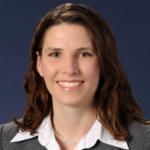
Ms. Moira S. Patterson
Director,
Global Market Affairs & Standards Partnerships,
IEEE Standards Association (IEEE SA)
As Global Market Affairs & Community Engagement Director for IEEE SA, Ms. Patterson oversees key initiatives related to digital inclusion and identity, digital resilience, data governance, and children’s online/offline experiences. She also manages strategic initiatives and engagements in Europe and Africa, including institutional relationships and capacity building activities. In her role, Ms. Patterson has facilitated dialogue among different stakeholders (industry, government, academia, and civil society) on Energy and ICT technologies and the intersection of technology and policy and worked in multi-stakeholder environments across various technical domains and industry sectors. By promoting standards’ potential to support sustainable development and greater inclusion, Ms. Patterson contributes to IEEE’s mission of advancing technology for the benefit of humanity.
Ms. Patterson has recently moderated panels at the Tallinn Digital Summit on AI and Healthcare (September 2019), at the ISO General Assembly on Standardization and SDG 7 – Energy (September 2018) and served as a panelist at the Open Government Partnership Summit in Ottawa (May 2019).
The IEEE-SA is a globally recognized standards-setting body that develops consensus standards through an open process that engages industry and brings together a broad stakeholder community. The IEEE-SA has a portfolio of over 1,250 active standards and more than 650 standards under development.
Ms. Patterson holds a B.A. in Political Science (Comparative Politics) from Western Washington University (USA) and an M.A. in Political Science (Comparative Politics, Developing Countries) from McGill University (Canada).
Abstract
The second part of the workshop will be a working session, where we will work in small groups to apply a sustainability measurement tool to gain feedback. The key participants for this session will be industry participants.
The tool is the Basic Sustainability Assessment Tool (BSAT), an Open Source tool developed by Bob Willard of Sustainability Advantage. It is described as “a comprehensive, generic sustainability self-assessment tool. It can be used by any-size organization, in any sector, in any country. It may be especially helpful for small- and medium-sized enterprises (SMEs), and large organizations with minimal / no sustainability staff.”
The feedback from the group is part of our global outreach and will provide important regionalized feedback to our work.
Organizing Committee

Maike Luiken, PhD, SMIEEE, IEEE-HKN, FIEC
Managing Director, R&D, at a start-up company
and
Adjunct Research Professor,
Western University, Canada
Maike Luiken, PhD, SMIEEE, IEEE-HKN, FIEC, chairs Planet Positive 2030 – an initiative of the IEEE Standards Association – and the P7800 Standards Working Group: Recommended Practice for Addressing Sustainability, Environmental Stewardship and Climate Change Challenges in Professional Practice. She co-chairs the IEEE Future Directions Climate Technologies Sustainability Initiative. She served as the IEEE VP MGA, 2021, and as President, IEEE Canada, 2018-19 and as Chair, Policy Track, IEEE Internet Initiative, 2017-18
Maike is a longtime advocate for sustainable development and is driven to develop and leverage technology to achieve a more sustainable planet.
She is managing director, R&D, at a start-up company and Adjunct Research Professor at Western University, Canada.
Maike’s career spans academia and industry: from professor to leading the Bluewater Sustainability Initiative, 2006-2013, founding Director, Lambton Manufacturing Innovation Centre, eight years as Dean, Lambton College, with several portfolios: School of Technology, Sustainable Development, and Applied Research. Her strategic leadership and vision led to Lambton College becoming one of the top Research Colleges in Canada.
Her areas of interest and expertise span diverse technical areas from ICT, energy, and water to advanced manufacturing. She has particular interest in how progress and deployment of various technologies contributes – or not – to achieving sustainable development.
She is currently serving/has been serving on numerous Boards of Directors and Committees, including IEEE, IEEE Canadian Foundation, Canadian Standards Council Steering Committee of the Artificial Intelligence and Data Governance Standardization Collaborative.
Maike has experience in the public and private sectors in Canada and has worked in the USA and Germany. She obtained degrees from the Technical University of Braunschweig, Germany, and the University of Waterloo, Canada (PhD, Physics).

Prof. Vikass Monebhurrun
Corresponding Member,
IEEE Region 8 Standards Coordination Subcommittee and
IEEE Technical Activities Board Committee on Standards
Vikass Monebhurrun received the PhD degree in electronics in 1994 and the Habilitation à Diriger des Recherches (HDR) in physics in 2010 from Université Pierre et Marie Curie (Paris VI) and Université Paris- Sud (Paris XI), respectively. He was engaged in research on electromagnetic non-destructive testing for nuclear power and aeronautical applications until 1998, following which he joined the Department of Electromagnetics at Supélec (CentraleSupélec since 2015). His research interests encompass time domain numerical modeling as well as radio frequency measurements. He actively participated in French National Research Programs on dosimetry of wireless communication systems since 1998: 2G (1999-2002) 3G (2003-2005) and 4G (2007-2010). His research contributed to international standardization committees of CENELEC (European Committee for Electrotechnical Standardization), International Electrotechnical Commission (IEC), and IEEE.
He is author and co-author of more than hundred peer reviewed international conference and journal papers, and he holds three international patents on antennas for mobile communications. He is an active contributor within the standardization committees of IEC 62209, IEC 62232, IEEE 1528 and IEC/IEEE 62704.
He was a member of the European COST Action BM 1309 on beneficial effects and medical applications of electromagnetic fields (2014-2018). Prof. Monebhurrun served as member of the Editorial Board of the IEEE COMPUMAG and IEEE CEFC conferences, and IEEE Transactions on Magnetics special issues from 1998 to 2020. He is the founder of the IEEE RADIO international conference for which he served as General Chair for all the eight editions since 2012. He serves as President of the Radio Society (Mauritius) since 2013. He currently chairs the IEC/IEEE 62704-3 and IEEE Antennas and Propagation Standards committees. He further serves as member within several committees of the IEEE Antennas and Propagation Society. From 2019 to 2022, he was an AdCom member of the IEEE Sensors Council. He serves as Corresponding Member of the IEEE Region 8 Standards Coordination Subcommittee and IEEE Technical Activities Board Committee on Standards since 2019. He served as Associate-Editor (2016-2021) and Guest-Editor (2018/2019) for the IEEE Antennas and Propagation Transactions and Editor of the IoP Conference Series: Materials Science and Engineering (2013-2019).
He is currently Editorial Board member of the IEEE Antennas and Propagation Magazine and maintains a column dedicated to standards related activities. He was the recipient of the Union Radio-Scientifique Internationale (URSI) Young Scientist Award in 1996, the IEEE Standards Association International Working Group Chair Award in 2017, the IEEE Ulrich L. Rohde Humanitarian Technical Field Project Award in 2018, the International Electrotechnical Commission 1906 Award in 2018 and the IEEE Standards Association International Award in 2019.

Ms. Moira S. Patterson
Director,
Global Market Affairs & Standards Partnerships,
IEEE Standards Association (IEEE SA)
As Global Market Affairs & Community Engagement Director for IEEE SA, Ms. Patterson oversees key initiatives related to digital inclusion and identity, digital resilience, data governance, and children’s online/offline experiences. She also manages strategic initiatives and engagements in Europe and Africa, including institutional relationships and capacity building activities. In her role, Ms. Patterson has facilitated dialogue among different stakeholders (industry, government, academia, and civil society) on Energy and ICT technologies and the intersection of technology and policy and worked in multi-stakeholder environments across various technical domains and industry sectors. By promoting standards’ potential to support sustainable development and greater inclusion, Ms. Patterson contributes to IEEE’s mission of advancing technology for the benefit of humanity.
Ms. Patterson has recently moderated panels at the Tallinn Digital Summit on AI and Healthcare (September 2019), at the ISO General Assembly on Standardization and SDG 7 – Energy (September 2018) and served as a panelist at the Open Government Partnership Summit in Ottawa (May 2019).
The IEEE-SA is a globally recognized standards-setting body that develops consensus standards through an open process that engages industry and brings together a broad stakeholder community. The IEEE-SA has a portfolio of over 1,250 active standards and more than 650 standards under development.
Ms. Patterson holds a B.A. in Political Science (Comparative Politics) from Western Washington University (USA) and an M.A. in Political Science (Comparative Politics, Developing Countries) from McGill University (Canada).